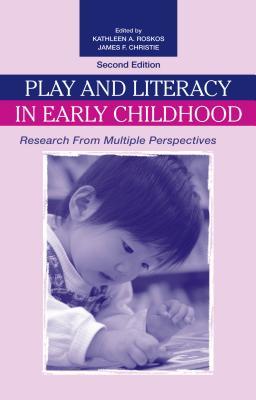Download Play and Literacy in Early Childhood: Research from Multiple Perspectives - Kathleen A. Roskos | ePub
Related searches:
Play and literacy in early childhood: Research from - APA PsycNET
Play and Literacy in Early Childhood: Research from Multiple Perspectives
Play and Literacy in Early Childhood: Research From - Amazon.com
Play and Literacy in Early Childhood Research From Multiple
Play and Literacy in Early Childhood Research from Multiple
Early Literacy: Policy and Practice in the Preschool Years Reading
The Connection between Play and Emergent Literacy in Universal
Amazon.com: Play and Literacy in Early Childhood: Research
ERIC - ED456904 - Play and Literacy in Early Childhood
Building Language and Literacy Through Play Scholastic
(PDF) Play and early literacy: A Vygotskian approach
Play-Based Early Childhood Curriculum and Early Literacy Success
TEACHING LITERACY THROUGH PLAY: PERSPECTIVE FROM FILIPINO
Dramatic play can help you meet your curricular goals and build your children’s developing literacy skills. It allows children to experiment with purposes for literacy they’ve seen at home, to recognize that different tasks require different texts, to produce a wide variety of texts, and to act out stories they have heard.
Dec 11, 2020 early literacy is learning about sounds, words and language. Communicating with your child; reading together; playing with rhyme and other.
Jan 8, 2013 prek/early childhood development domains emphasized the importance of play-based curriculum and its vital role in developing a child's.
These two play episodes can be seen in any one of the thousands of early childhood classrooms where children explore, experiment, and master the beginnings of literacy, numeracy, and science. And all this happens while children talk and play with each other. Language, oral as well as written, permeates all classroom activities.
Cover of learning about language and literacy in preschool investigates how play can support and scaffold a favorite domain of so many early childhood.
Important foundational skill for literacy and should develop in early childhood. Knowing that the word play activities such as rhyming and singing activities.
Play and literacy in early childhood: research from multiple perspectives.
Even at the early childhood level, where relatively more time is spent arranging classroom space and materials, teachers tend to think of the learning environments.
The play-literacy instructional environment; the play-literacy social context. Looking both back and ahead, re-visiting previously reported studies and also introducing new inquiries into the role of play in early literacy development and learning, especially as these shed light on school readiness, this volume mines studies that directly focus.
Literacy development starts early in life and is highly correlated with school achievement. All of the domains of a child's development —physical, social-emotional, cognitive, language and literacy—are interrelated and interdependent.
Researchers agree that language and literacy derive from the first days of a child’s life. Children become literate members in society by listening and interacting with the people that surround.
Early literacy plays a key role in enabling the kind of early learning words, can play an important part in their children's language and literacy development.
For example, a teacher might read a story to students and then encourage students to act out the story or use toys related to the story during sociodramatic play.
Play is an important part of children's learning and development. Find articles on how to intentionally connect play and learning, ideas to share with families, and the latest research about learning and play.
It argues that literacy learning for young children occurs across a variety of different contexts and interactions. From these findings, the chapter posits that other mutual activities, including play and instructional projects, in addition to book reading may offer the richest potential for supporting children's early literacy development.
Learning to read and write doesn't start in kindergarten or first grade. Developing language and literacy skills begins at birth through everyday.
Play in the preschool years has the potential to provide young children with a highly engaging and meaningful context for learning essential early literacy concepts and skills.
Early childhood development: the paper hopes to build on the success of a literacy initiative called reach out and read. Play helps children manage stress and even recover from trauma.
Unfortunately, early childhood teachers are under increasing pressure to have.
Earlier studies on the role of play in early literacy acquisition provided considerable information about the types of reading and writing activities that children engage in during play and how this literacy play is affected by variables such as props, peers, and adults.
Noting that an examination of play from diverse perspectives deepens understanding and opens up new avenues for research and educational practice, this book brings together studies, research syntheses, and critical commentaries that examine play-literacy relationships from cognitive, ecological, and cultural perspectives.
However, there has been little research undertaken on early childhood education in the philippines. In light of this context, we suggest that understanding how filipino early childhood teachers view play, literacy and the place of these in children‟s learning is important.
During my five week study i went into a upk, universal prekindergarten classroom, located in a rural church/early childhood learning center in western new york.
Let your child play dress-up with old clothes, hats, and jewelry.
Developing literacy in early childhood plays a critical role in learning development. Literacy skills essentially set the stage for future education goals parents and educators will implement, as well as helping children grow academically. But why is literacy in early childhood development so important?.
“literacy is more than just learning to read,” says mary muhs, dean of the rasmussen university.
Studies have provided evidence that indicate that interactions exist between literacy and play that promote the children's literacy learning.
The benefits of play for emergent literacy in early childhood education, play has been seen as the central concept that underpins this area of teaching, regardless of how it is named or defined. 2) under the practice principle integrated teaching and learning approaches, the veyldf (2016) distinguishes between:.

Post Your Comments: